Understanding the Metaverse: A Comprehensive Guide to Extended Reality Technologies

In this advanced, technologically-driven world, virtual realities have taken the stage like never before. It is imperative to change our perspectives and see things from a more futuristic point of view - a view that takes us into the realm of Extended Reality (XR). This concept that unites real and virtual environments, including human-machine interactions generated by computers and wearable technology, is changing the landscape of interactive experiences.
The Pioneers of XR: VR, AR, MR
Extended Reality (XR) serves as an umbrella term that encapsulates the collective spectrum of Virtual Reality (VR), Augmented Reality (AR), and Mixed Reality (MR). VR is a completely immersive, digital experience where every object is computer-generated. AR overlays virtual objects to the real world. Conversely, MR, also known as hybrid reality, creates an environment where virtual and real-world objects co-exist and can interact with each other in real-time. These technologies tee up the perfect pitch for the emergence of XR and fundamentally change the dynamics of human-machine interaction.
Digging Deeper: The Expansive Applications of Extended Reality
Industries and businesses around the world have begun to tap into the abundant potential of XR. The field of education is witnessing the change brought by XR, transforming traditional ways of learning and making education fun and interactive. Professionals in the the healthcare sector use XR for surgical training and patient care. The travel industry uses XR to provide interactive previews of destinations, and retail businesses employ XR to offer virtual 'try before you buy' experiences. Such diverse implications prove the widespread outreach of XR in various sectors.
Towards the Future: Extended Reality as a Business Tool
Extended reality is not merely a tech gimmick; it has plenty of real-world implications that businesses can leverage to their advantage. With XR, businesses can improve customer engagement, increase productivity, expedite processes, and refine their training methods. Leveraging XR in marketing campaigns could significantly improve brand recall and customer retention rate, while in the manufacturing sector, XR could blur the boundaries between the virtual designing process and the actual production.
The Metaverse: The Pinnacle of XR Technology
When we talk about XR, one cannot ignore the exciting concept of the metaverse. Imagine a virtual universe, a collective virtual shared space including the sum of all virtual worlds, augmented reality, and the internet. This is the metaverse - a digital reality where users can interact with a computer-generated environment and other users. The metaverse opens up infinite opportunities for gaming, social media, e-commerce, and virtual workplaces.
The Ethical Concerns in XR: A Critical Examination
While the advancements and possibilities of extended reality are indeed exciting, it is equally essential to cautiously examine the ethical ramifications. Issues concerning privacy, psychological impacts, and data security become increasingly significant in the realm of XR and demand thorough examination. To ensure the safe use of XR, proper guidelines, regulations, and security measures are quintessential.
To wrap up, extended reality is not just a trend or hyped phenomenon; it is the future of human-digital interaction. The earlier businesses start to adapt, the better positioned they'll be in the ever-evolving digital landscape.



